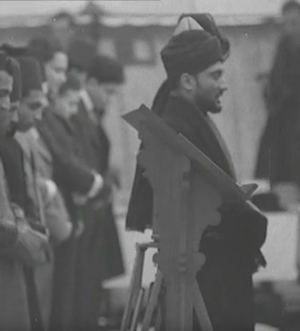| Home |
| History |
| Personalities
Maulana Aftab-ud-Din Ahmad |
| Work |
| Photographic archive |
| Film newsreel archive |
| •
Contact us • Search the website |
Maulana Aftab-ud-Din Ahmad (1901–1956)Assistant Imam of the Woking Mosque, 1931–1932Imam of the Woking Mosque, 1934–1939Editor of The Islamic Review and The Light, author and translator
Maulana Aftab-ud-Din Ahmad leading prayers at the Woking Mosque in 1936 Maulana Aftab-ud-Din Ahmad made a vast contribution to the work of the Lahore Ahmadiyya Movement for some thirty years before his untimely death. This included his immense contribution to the Woking Muslim Mission and its magazine The Islamic Review. If a ‘search’ is done on this website for his name (using the ‘Search the website’ link in the left column of this page), a very large number of results come up, showing in particular his articles in The Islamic Review and links to our photographic and Film newsreel archive. For example, there is a newsreel item in which he is showing leading prayers; see the first item in this newsreel at YouTube. There is a photo at this link which shows him receiving Crown Prince Faisal of Saudi Arabia in 1939 at Woking. Below we reproduce his obituary which appeared in The Islamic Review, April 1956, p. 19, under the heading: In Memoriam. It is with deep regret that we record the loss by death of the late Maulavi Aftabud Din Ahmad, which took place at Lahore, West Pakistan, on 13th January 1956. The Maulavi Aftabud Din Ahmad was closely associated with the work and progress of the Woking Muslim Mission and Literary Trust, Woking, England, from 1931 till he breathed his last. Born in January 1901 in the village of Tola, Burdwan, India, he received his early education in the home town of Burdwan. After getting his Bachelor of Arts with distinction in 1923 from the Presidency College, Calcutta, he grew more and more conscious of the fallen condition of the Muslims of India with whose political life he had come into contact as a result of his working voluntarily for the Khilafat Movement for about four years. This awakened in him the desire to have a first-hand knowledge of Islam. He joined the famous religious seminary of Deoband, near Delhi, where he studied under such renowned scholars as the late Shabbir Ahmad Uthmani for one-and-a-half years. In his search for a more up-todate interpretation of Islam he now turned himself to the late [Maulana] Muhammad Ali, the first Indian Muslim translator of the Holy Quran into English. He soon made up his mind to go to Lahore for a study of comparative religion under the guidance of eminent scholars like the late Muhammad Ali and others who had joined the band of the workers of the Ahmadiyya Anjuman Isha‘at-i-Islam, Lahore, now in Pakistan. During his stay at Lahore he joined the editorial staff of the fortnightly The Light, headed by the Maulavi Yaqub Khan, now Editor of the English daily, the Civil and Military Gazette, Lahore. His zeal for carrying the message of Islam to the world soon caught the eye of his friends, including [Maulana] Muhammad Ali, who asked him to start an Islamic missionary movement at Shillong, Assam, India, among the most advanced of hill tribes — the Khasis, under the aegis of the Maulavi Abdul Karim Khan Islamic Mission Trust of Calcutta. While in charge of the Islamic Mission at Shillong he wrote several books and brochures on Islam in the Khasi language and built up for the Mission a strong support of the local leading Muslims, such as the late Sir Sa‘dullah. His lectures and books brought many new adherents to Islam from the Khasi tribe. His successful career as a Muslim exponent of Islam attracted the attention of the late Khwaja Kamal-ud-Din, who asked him to join the Woking Muslim Mission staff. Mr. Ahmad, who was equally anxious to broaden his experiences about Islam in the West, agreed to join the Woking Muslim Mission and Literary Trust, Woking. He came to England in 1931 and acted as Assistant Imam of the Shah Jehan Mosque, Woking, England, for two years, when his health broke down to such an extent that he was compelled to return to his homeland. Later he took up the editorial responsibilities of The Islamic Review, which used to be edited and printed at Lahore in those days. Once again, after having recuperated his health, he returned to England, this time to act as Imam of the Shah Jehan Mosque, Woking, England. Just before World War II he returned to India, in 1939, and once again took up the Editorship of The Islamic Review and the revision work of the books of the late Khwaja Kamal-ud-Din. In 1948 he was appointed Secretary of the Woking Muslim Mission. In 1950 he became Editor of the English weekly, The Light. Simultaneously he started the translation of the Sahih of Bukhari into English, including the notes from Maulana Muhammad Ali’s Urdu translation and commentary of Sahih Bukhari, Fadl-ul-Bari. He had only completed the translation of the first thirteen “Books” when his untimely death occurred on 13 January 1956. Among his notable writings are those on Communism and an English translation of the Arabic work of the Shaikh Abdul Qadir al-Gilani, Futuh al-Ghaib. |
the successor of the Woking Muslim Mission.
